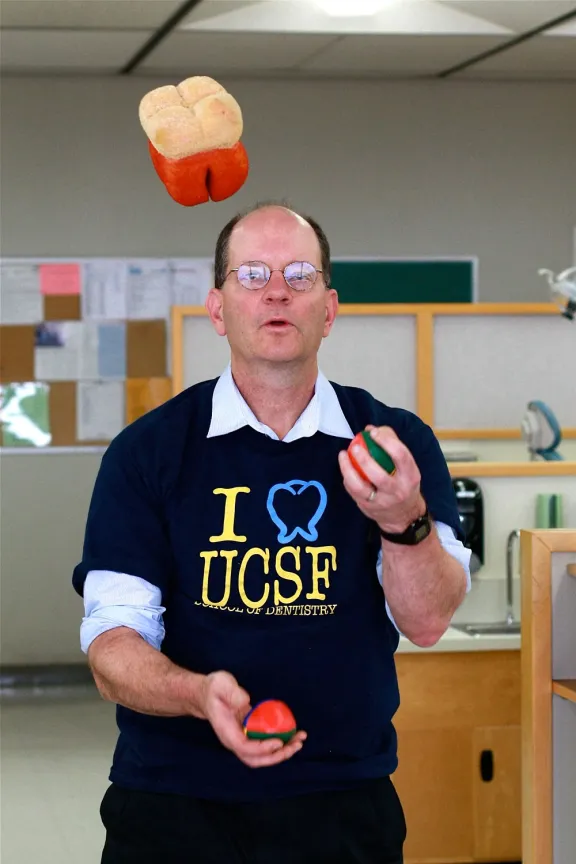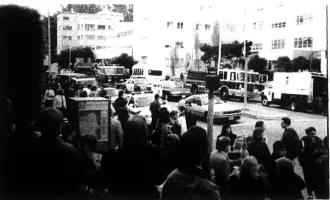
Name a UCSF Periodontist Who is a Championship- Calibre Trivia Contestant?
Hint: He’s also appeared on Jeopardy, Super Password and Who Wants to Be a Millionaire
Synapse: Dr. Ryder, you’ve been at UCSF since 1979. Have you been featured in Synapse before?
Ryder: Actually, I wrote the first crossword puzzle ever published in Synapse. That was in 1983. It was all about things local to this campus. Then there was an article about my participation in a national crossword competition, that was in the mid ’80s, and an online article in Synapse in 2010 on leading a UCSF team to a large pub championship for the Bay Area. Nothing has been written since then.
Synapse: Are you still writing crosswords and competing?
Ryder: Oh, I’ve retired from crosswords. I was a little better at trivia, which is a hobby I still pursue.
Synapse: Right, I’ve heard about the famous video from your Jeopardy appearance. Tell us more about your trivia career.
Ryder: I’ve been on Jeopardy, Super Password, The Challengers and twice have been flown out to be in Who Wants to Be a Millionaire but didn’t win the fast finger either time. But actually, the national and international trivia tournaments are what I do more these days. I go to the North American Tournament every year in Las Vegas, for example, and compete with Ken Jennings, Brad Rutter, and other well-known trivia players. And for last year’s Asian American Trivia Championship here in San Francisco, I organized a team that included four dental students. Their more youthful knowledge really helped us get first place.
Synapse: What’s been your greatest trivia achievement?
Ryder: Well, I don’t know about greatest, but last year in the World Quizzing Championship, I finished first in the sixty-and-over division.
Synapse: What has been the funniest question you’ve ever been asked?
Ryder: The funniest question . . . hmmm . . . last year I got asked, “2010 saw the premiere of an opera titled ‘U.’ ” This was the world’s first, and probably last, opera sung in what language?”
Synapse: What was it, Esperanto?
Ryder: Close! It was in Klingon.
Synapse: This is fun; do you have a few other memorable ones?
Ryder: Last year, I was in a head-to head contest against Steve Perry, who is widely regarded as the best trivia player in the United States, for the North American Championship, and we were tied in quadruple overtime. The two questions were, “All fifty states are divided into counties except which two?” and “In the history of Time magazine’s Man of the Year, there has only ever been only one then-active member of the U.S. House of Representatives chosen—who was it?”
Synapse: Hmmm, we’ll let our readers ponder those and publish the answers at the end of the article. In addition to trivia, you’re famous for incorporating magic tricks into your lectures. When did you start studying the magician’s art?
Ryder: I really got serious about magic when I was in dental school at Harvard. In those days, the medical students and dental students would host a show together for the school, and I started performing then.
Synapse: What’s your favorite trick?
Ryder: I love using both trivia and magic to enhance my teaching. So the trick I enjoy doing the most is a classic cups-and-balls trick, where balls keep accumulating under the cups, except I present it as the microbiology of periodontal disease, where the balls represent bacteria accumulating in biofilms. Finally, as the disease progresses, the balls magically turn into pieces of fruit, and I use yellow, orange, and red fruits to signify the yellow, orange, and red complexes of bacteria in the biofilm.
Synapse: So, besides magic, what’s really exciting in the field of periodontology these days?
Ryder: As the incidence of periodontitis has declined in the last decades, the field has really been turning more toward complex implant procedures, bone and soft tissue grafts, and plastic surgery to improve the appearance of the gingiva. The next breakthrough will probably be in regeneration, gene therapy, stem cell biology—those types of cutting-edge approaches. Also a lot of research continues to examine possible links between periodontitis and systemic conditions, such as diabetes.
Synapse: What is your most exciting research project right now?
Ryder: One big thing I’m working on is a multi-center study with Barbara Moscicki from the med school and Caroline Shiboski from oral medicine. We’re studying children and adolescents with HIV, their oral condition and oral bacteria, and looking for correlations with other medical conditions and cognitive ability.
Synapse: You’re from New Jersey then spent a while in Boston—what made you originally move to San Francisco? Was it the research opportunities at UCSF?
Ryder: Boston at the time was a little more sclerotic in its thinking, and more intolerant. And the weather was horrible. Real free-thinking, creativity, innovation—you could feel it in San Francisco in the ’70s. There was more tolerance and diversity, you could think differently, develop new ideas , and take real chances.
Synapse: So if a student is thinking about applying to your periodontal program, would you say the location is its greatest attribute?
Ryder: In addition to being in this wonderful city, we are the oldest program west of the Mississippi and the only one in Northern California. For this second reason, we have a very large patient pool to draw on. Also we have a great diversity of faculty, and our philosophy is not to teach students a certain way of doing things, but rather to give them knowledge of all the different approaches represented by our different faculty, teach students to think critically and make their own choices about the best approaches for their own future practices.
Synapse: Speaking of giving students knowledge, how about the answers to those two questions?
Ryder: Neither Louisiana or Alaska has counties, and Newt Gingrich was once Time’s Man of the Year. And for sports fans and readers of Synapse, here is one of my favorite sports trivia questions of all time (no answer here, it will take some time to think about it<can we supply the answer, please?): In the history of the four major sports leagues, MLB, NFL, NBA and NHL, only two cities have had their teams compete against each other in all four final championship series or games. Name those two cities.


